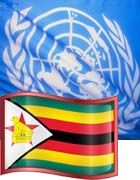Human rights group: Zimbabwe's army in new wave of violence
 Johannesburg/Zimbabwe The Zimbabwean army is responsible for a new wave of brutal attacks against opposition Movement for Democratic Change (MDC) members and supporters throughout Zimbabwe, Human Rights Watch (HRW) said Wednesday.
Johannesburg/Zimbabwe The Zimbabwean army is responsible for a new wave of brutal attacks against opposition Movement for Democratic Change (MDC) members and supporters throughout Zimbabwe, Human Rights Watch (HRW) said Wednesday.
The Malawian HRW delegate told South African radio that military forces were providing trucks and equipment to militias, so-called "war veterans" who have been implicated in numerous acts of torture and other violence against MDC members and supporters.
"The scene in Zimbabwe is one of horrific violence. We're seeing people who are held hostage," said Tiseke Kasambala.
She said that during a two-week visit to the country, which has been in crisis since the March 29 presidential elections, she had come across horrendous violence, particularly in rural areas.
Victims were being intimidated into voting for President Robert Mugabe in a possible second round of presidential elections.
"The African Union and UN Security Council should take immediate steps to help prevent a further escalation in violence," said Georgette Gagnon, Africa director at HRW.
An MDC delegation was at UN headquarters Tuesday holding talks with some UN Security Council members to try to convince them to send a fact-finding mission or a special envoy to assess the situation.
But the fact that the idea of a mission or special envoy received no unanimous support from the council's 15 members was being hailed as a positive result by state-controlled media in Zimbabwe.
The official results of the country's presidential elections on March 29 are still unknown.
The Zimbabwe Electoral Commission (ZEC) said Monday that it had the figures from the controversial partial recounting of the presidential election results, but the final verification of results would take three days.
A partial recount has confirmed the defeat of Mugabe's ruling Zanu PF party, but the government maintains that a run-off must be held between MDC leader Morgan Tsvangirai and Mugabe who has ruled the country for 28 years. (dpa)